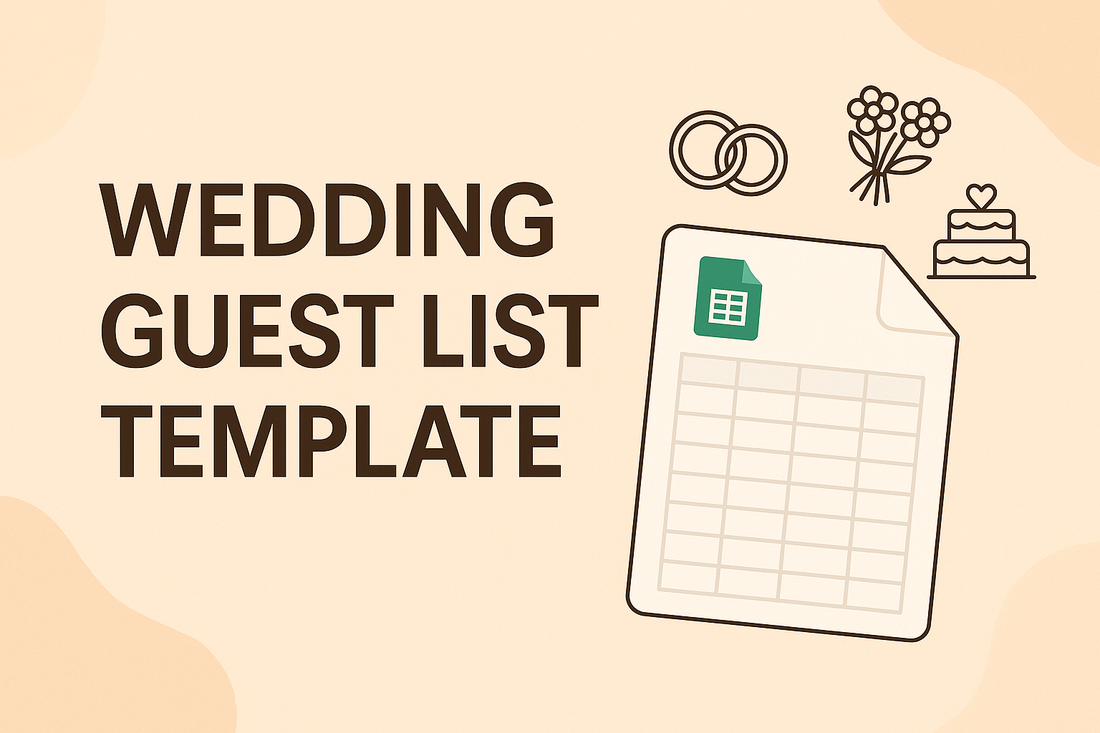Wedding Guest List Template in Google Sheets: Organize Contacts, RSVPs & Meals
Your guest list drives almost every wedding decision — from venue capacity to catering costs. If it lives across messages, notes and random files, mistakes are guaranteed. A well-structured Google Sheets guest list keeps everything in one place, easy to update and share with your partner.
Still setting your numbers? Read our guide: Wedding Budget Spreadsheet.
Why Use a Guest List Spreadsheet (Not Apps or Notes)
-
Single source of truth: contacts, RSVPs, meals, and seating data in one sheet.
-
Real-time collaboration: edit with your partner/family without version chaos.
-
Simple filtering & counts: see totals by status, meal, family side, children, etc.
-
Future-proof: export to seating, vendor printouts, and thank-you tracking.
What to Include in Your Guest List (Columns & Categories)
Guest & Household Info
-
Household ID (e.g., H-001), Last Name / Household Name
-
Guest First Name, Last Name, Role/Side (Partner A / Partner B / Both)
-
Party Size, Adults, Kids, Plus-One Allowed? (Yes/No)
Contact & Address
-
Email, Phone, Street, City, State/Region, ZIP/Postal, Country
Attendance & RSVP
-
Invite Sent? (Yes/No/Date)
-
RSVP Status (Invited / Attending / Declined / No Response)
-
Headcount (1 per person; auto-sum for households)
-
Notes (travel, accessibility, room block, etc.)
Meal & Dietary
-
Meal Choice (Beef / Chicken / Veg / Vegan / Kids / Other)
-
Dietary Needs (allergies, gluten-free, halal, kosher)
Seating & Logistics
-
Table Name/Number, Seat #
-
Group (Family, College, Work, etc.)
Gifts & Thank-You
-
Gift, Thank-You Sent? (Yes/No/Date)
Set Up Your Google Sheet (Step-by-Step)
1) Create the Sheet & Freeze the Header
-
Name it “Wedding Guest List”.
-
Row 1 = headers. View → Freeze → 1 row for easy scrolling.
2) Add Data Validation (clean inputs)
-
RSVP Status: Data → Data validation → Dropdown: Invited, Attending, Declined, No Response.
-
Meal Choice: Dropdown list for your catered options.
-
Plus-One Allowed?: Dropdown Yes/No.
3) Use Conditional Formatting (quick visuals)
-
Color rows where RSVP Status = “No Response”.
-
Color Dietary Needs cells when not empty.
4) Basic Totals (ready-made formulas)
-
Total Guests Invited:
=COUNTIF(RSVP_Status_Range,"<>")(or count names) -
Attending (People):
=COUNTIF(RSVP_Status_Range,"Attending")(if one row per person) -
Declined:
=COUNTIF(RSVP_Status_Range,"Declined") -
Kids Attending:
=SUM(Kids_Column) -
Meal Counts: e.g., Beef
=COUNTIF(Meal_Choice_Range,"Beef")(repeat per option)
Tip: Put these summary cells at the top of the sheet so headcounts are always visible.
5) Create Filter Views
-
Data → Create a filter.
-
Save filter views for “No Response”, “Kids only”, “Partner A side”, “Vegetarian”, etc.
Managing +1s, Kids & Households (Without Chaos)
Two reliable setups:
A) One Row per Person (most flexible)
-
Every individual (including +1s and kids) gets a row.
-
Use Household ID to tie people together.
-
Totals and meal counts are precise; seating is easier.
B) One Row per Household (compact)
-
One row per invitation; use Party Size, Adults, Kids columns.
-
Faster for small weddings; less detail for meals/seating later.
Recommendation: One row per person for clarity and smoother seating.
Tracking RSVPs and Meal Choices
-
Record replies as they arrive (email, phone, text, website).
-
Change RSVP Status and Meal Choice immediately.
-
Use a filter view “Missing Meal Choice” to chase gaps before the catering deadline.
-
For destination weddings, add Travel & Accommodation notes to households.
How to Connect Guest List → Seating Chart
-
Finalize Attending counts.
-
Group guests by families/friends and flag special constraints (mobility, kids near parents).
-
Assign Table Name/Number and Seat # columns.
-
Export a venue-friendly PDF of Table → Guests for setup and the caterer.
Want it smoother? The Wedding Dream Planner Bundle links Guest List ↔ Seating ↔ Timeline so updates flow automatically.
Common Mistakes to Avoid
-
Mixing people and households randomly (choose one structure and stick to it).
-
Forgetting kids or +1s in totals → headcount shocks later.
-
Not using dropdowns → messy data, wrong counts.
-
Tracking meals in notes instead of a proper column.
-
Ignoring dietary needs until the week of the wedding.
-
Leaving “No Response” guests untouched — schedule one follow-up date.
FAQ: Wedding Guest List Spreadsheet
Q1: Excel or Google Sheets?
Google Sheets is perfect for sharing live; Excel is great offline. Both work — choose what suits your workflow.
Q2: One row per person or per household?
For accuracy with meals/seating, use one row per person and tie them with a Household ID.
Q3: How do I keep headcounts accurate?
Use dropdowns for RSVP Status and formulas like COUNTIF to total Attending by people and by meals.
Q4: How do I manage last-minute changes?
Keep filter views for “No Response” and “Changes This Week”. Update immediately and re-export seating PDFs.
Q5: What about privacy?
Limit edit access to trusted people. Avoid sensitive data beyond what you need for the event.
Final Thoughts
A clean guest list is the backbone of a smooth wedding day. With Google Sheets, you’ll keep invites, RSVPs, meals, and seating organized — without app overload or confusion.
Ready to skip the setup and use a proven system?
The Wedding Dream Planner Bundle includes an integrated Guest List, Seating Chart, Timeline, Vendor Comparison, and more — built to work together.
👉 Get the Wedding Dream Planner Bundle and plan with confidence.

